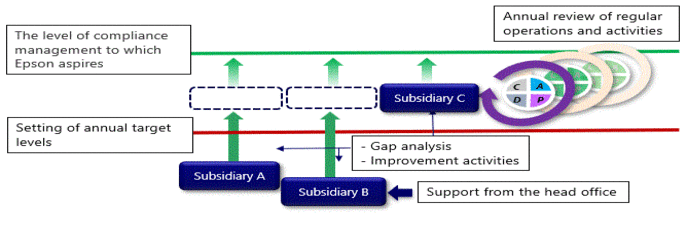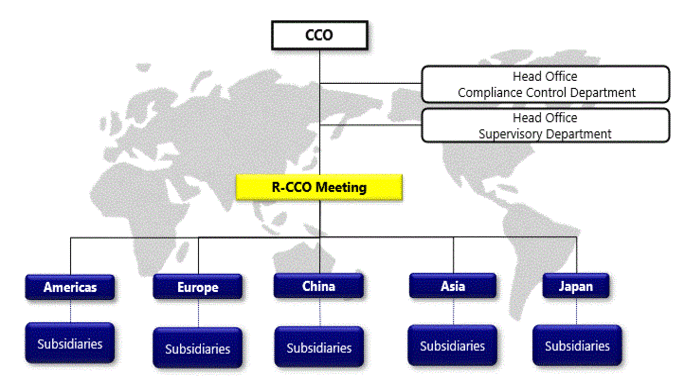Internal Control Initiatives
- Compliance Activities
- Anti-Corruption/Anti-Bribery
- International Trade Control Initiatives
- Tax Compliance Policy
Compliance Activities
Epson engages in a variety of compliance activities to ensure that we observe all applicable laws, regulations, company rules, and business ethics and meet the expectations of society. The Epson Way (comprising the Management Philosophy, Principles of Corporate Behavior, and the Epson Global Code of Conduct) represents the shared values and expectations of conduct within the Epson Group, forming the foundation for our compliance efforts. To deeply root compliance awareness and ensure effectiveness, we have translated the Epson Global Code of Conduct into 17 languages. In addition, we provide a wide range of compliance training to officers and employees. This training includes online courses and rank-specific training given by internal and external instructors.
October is Compliance Month at Epson. One of the things we do across the global Epson Group during the month is to remind officers and employees of the Epson Way, the foundation on which our business activities rest, and urge them to maintain high ethical standards. We raise compliance awareness by having the chief compliance officer and the heads of our business units and subsidiaries issue compliance messages, familiarizing employees with the Epson Global Code of Conduct, giving compliance training, and conducting a Compliance Awareness Survey. The results of the Compliance Awareness Survey, which is conducted globally, are analyzed by department and company to identify issues that we then correct.
Global Compliance Activities
The Epson Group shares a common goal of managing compliance to create a safe environment where every officer and employee can shine and pursue higher goals. To achieve this, we have introduced global compliance activities throughout the Group. We set targets for each fiscal year, evaluate the compliance systems and operations of each organization and subsidiary, and make improvements. We raise the level of compliance across the entire Group and minimize risks by implementing the PDCA cycle.
Global Compliance PDCA

R-CCO Organization
A regional chief compliance officer (R-CCO) system has been established to promote the global compliance activities. Group companies are divided into five regional blocs, each headed by an R-CCO who leads the compliance activities in that bloc. The blocs are determined based on geographical proximity and similarities in linguistic, regulatory, cultural, and other factors, facilitating collaboration among compliance personnel in the bloc when they address common issues. An R-CCO meeting is held once every six months with the participation of the CCO and all R-CCOs to increase the coordination across the entire Group. In addition, area meetings are held to develop compliance activities unique to the region. Each bloc works to achieve its goals by implementing Group-wide compliance policies, issues, and measures.

Anti-Corruption/Anti-Bribery
Basic Principles
Principle 5, "Ensuring effective governance and compliance," in Principles of Corporate Behavior, states that we will not tolerate bribery, corruption, dishonest marketing, cartels, insider trading, or conflict of interest and that we will conduct all transactions in accordance with these principles, promoting fair and open competition in the marketplace.
To put this principle into practice, Epson created the Epson Global Code of Conduct, which explains actions that officers and employees are expected to take based on the understanding of the Principles of Corporate Behavior. The code impresses upon employees the need to seek profits by proper means and to immediately report conduct that is or could lead to a violation.
Principle 7, "Working with business partners for mutual benefit," in Principles of Corporate Behavior strictly forbids acts of bribery and collusion with business partners and demands that our business partners adhere to a zero-tolerance policy regarding illegal and unethical business practices. Moreover, in Anti-Bribery, Anti-Corruption, and Competition Law (Antimonopoly Act) Guidelines for Business Partners, we strongly urge our business partners to understand Epson’s values and to eliminate any corruption, including but not limited to involvement in bribery, cartels, insider trading, and conflict of interest. We insist that they conduct all transactions in accordance with these principles, promoting fair and open competition in the marketplace.
Epson Group Supplier Guidelines stipulates that Epson conducts business in a way that does not depend on entertainment or the like from suppliers. We also ask our suppliers to promptly report to us or consult us regarding violations or potential violations by Epson officers and employees.
Anti-Corruption Efforts
Epson regards all forms of corruption to be a serious risk that could undermine organizational integrity and public trust. We therefore are committed to preventing corruption of any kind. Working with corporate supervisory departments, the compliance control department oversees entertainment and gift-giving, invitations, donations, sponsorships, agency management, hiring, and other operations.
| Topic | Description |
|---|---|
| Response to risks | Corruption risks are evaluated based on the likelihood of corruption [per the Corruption Perceptions Index (CPI)] in countries and territories around the world and at Epson's overseas subsidiaries, as well as on the impact that an incident of corruption would have. Control plans are formulated and executed every year for high-risk organizations. The department that supervises compliance evaluates the effectiveness of the plans and reports its findings to the chief compliance officer (CCO). |
| Business partners |
We inform our business partners of the Anti-Bribery, Anti-Corruption, and Competition Law (Antimonopoly Act) Guidelines for Business Partners and the Epson Group Supplier Guidelines, and we strongly urge our business partners to eliminate any corruption, including but not limited to involvement in bribery, cartels, insider trading, and conflict of interest. We also insist that they conduct all transactions in accordance with these principles, promoting fair and open competition in the marketplace. - Customers - Suppliers We require all our suppliers to comply with the Epson Group Supplier Guidelines, which includes the RBA Code of Conduct, and we ask them to sign contracts or agreements to do so. 1 RBA Code of Conduct D1: Business Integrity (The highest standards of integrity shall be upheld in all business interactions. Participants shall have a zero-tolerance policy to prohibit any and all forms of bribery, corruption, extortion and embezzlement) and D2: No Improper Advantage (Bribes or other means of obtaining undue or improper advantage shall not to be promised, offered, authorized, given, or accepted. This prohibition covers promising, offering, authorizing, giving or accepting anything of value, either directly or indirectly through a third party, in order to obtain or retain business, direct business to any person, or otherwise gain an improper advantage. Monitoring, record keeping, and enforcement procedures shall be implemented to ensure compliance with anti-corruption laws.) 2 RBA Code of Conduct D5: Fair Business, Advertising and Competition |
| Entertainment and gift-giving | Illegal and unethical gifts and entertainment are prohibited. All gift-giving and entertainment is subject to advance reporting, review, and approval. |
| Training |
We formulate annual compliance training plans. Every October, which is designated as Compliance Month, we provide officers and employees with an online course to share information about cases of bribery and corruption. |
| Response to incidents | If a violation that has a material impact on Group management should occur, the Crisis Management Committee will be called upon to invoke the crisis management program. |
International Trade Control Initiatives
Epson is a multinational corporation with production centers, sales centers, customers, and business partners around the world. Smooth international trade operations are essential for delivering Epson products and services to customers in a timely manner.
Meanwhile, we must observe own regulations of each country to respond the changes in international situation as well as numerous conventions and frameworks governing international trade that have been put in place to maintain international peace and security.
To maintain compliance with these and to ensure smooth trade, Epson has established comprehensive systems for reliable trade management for entire EPSON Group. As a result, EPSON Group companies have many certifications around the world as companies that complies with the systems and programs established by the authorities of each county in Japan, North America, Latin America, Europe, China, Asia, etc., especially in areas of security trade control and security management that strict operations are required.
These contribute to an efficient and speedy supply chain for the entire group, such as simplification of import/export procedures and cost reduction.
Tax Compliance Policy
Epson seeks to fulfill its corporate social responsibility by paying appropriate taxes in compliance with the spirit as well as the letter of the tax laws and regulations in the countries and regions where it operates. In accordance with this basic policy on taxes, we are taking the actions below to maintain and improve tax compliance.
1.Tax governance
- The Board of Directors is responsible for overseeing tax risk, and Epson's Chief Financial Officer is the responsible official of Group tax affairs. The group that is in charge of tax affairs reports and manages taxes is under the supervision of the Chief Financial Officer.
- Epson considers tax risk to be an important risk, and regularly reports such risks to the board of directors and the Corporate Strategy Council, which is composed of directors of the company.
- Employees are trained in the tax-related regulations and business process standards that Epson has established to ensure that it properly fulfills its tax obligations. We conduct periodic internal tax audits and report the findings to top management and to the Audit & Supervisory Committee.
2.Monitoring tax affairs
- We appropriately respond in a timely manner to changes in local tax systems and taxation trends through regular reporting among the group that is in charge of tax affairs and Epson's local subsidiaries.
- We enlist the support of tax accounting firms and other external experts for advice on taxes and for tax support in each country and region.
3.Tax planning and Tax avoidance
- Around the globe, we strive to effectively use preferential taxation systems where possible in our normal business activities to ensure a suitable tax burden.
- We do not transfer value created to low tax jurisdictions, and do not use tax structures intended for tax avoidance without the spirit of the law.
4.Dealing with uncertainty
- Tax risk uncertainty is expected to increase as countries and regions around the globe strengthen their tax reporting obligations, tax audits, and tax enforcement. Epson controls tax risks by identifying situations that could potentially pose serious tax risks.
5.Transfer pricing taxation
- Epson complies with local tax laws and OECD guidelines to control transfer pricing tax risks. We have established transfer pricing guidelines for the Epson Group to help ensure appropriate transfer pricing transactions. In line with these transfer pricing guidelines, we control the profitability range of our global subsidiaries to ensure that transactions are made at arm's length.
- We use an advance pricing arrangement (APA) for transactions with subsidiaries in high-risk countries.
6.Anti-tax haven rules (also known as Japanese Controlled Foreign Company rules, or "CFC")
- Epson sets up foreign subsidiaries to carry out its ordinary business activities, but does not do so in "tax haven" jurisdictions to avoid taxes. When anti-tax haven rules apply, Epson properly files and pays taxes.
7.Relationships with tax authorities
- Epson strives to work in good faith with tax authorities and to maintain and improve good tax corporate governance.



